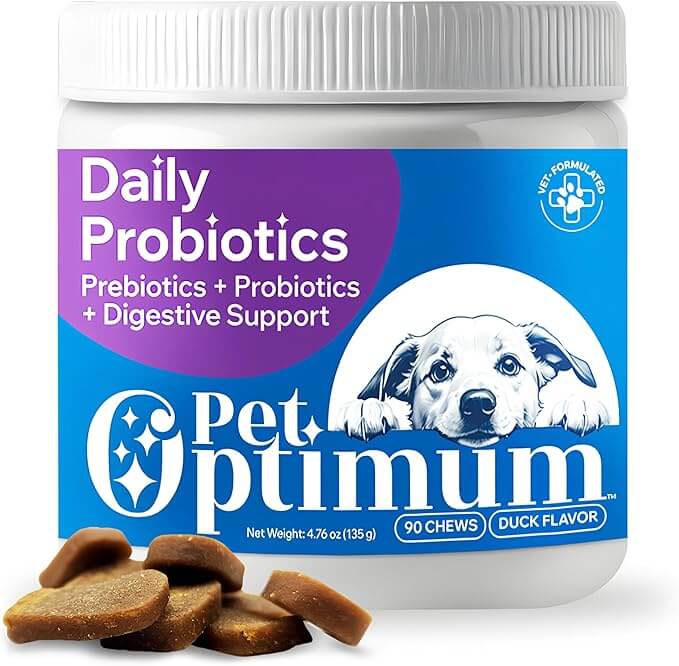
How long do French Bulldogs live? 10 to 14 years for healthy standard-sized Frenchies, according to the American Kennel Club (AKC). Healthy mini or Teacup French Bulldogs can live for up to 10 to 12 years. Although there is a case of a Frenchie living for as long as 18 years. Fortunately, there are plenty of factors that affect the French Bulldog lifespan that is within the dog owners’ control.
If you own a Frenchie or are thinking about getting one, you probably want to know what the average lifespan of a French Bulldog is. This way, you’ll know how many years of companionship, happiness, and laughter you can expect to share with your small canine companion.
In this article, we’ll discuss the life expectancy or the average lifespan of the standard, mini, and Teacup French Bulldog. We will then share several helpful tips on how to make your French Bulldog live longer. Ready to find out? Let’s begin!
Table of Contents
French Bulldog average Lifespan

French Bulldogs (whether you have a Fluffy French Bulldog or a short coat Frenchie) are one of the most loyal and affectionate canine companions you’ll ever find with a playful and gentle personality.
They make great family dogs since they are great with small children and other pets in the house.
So it’s no wonder why we want our Frenchies to live long lives alongside us and our family.
If you’re wondering, “what’s the average lifespan of a French Bulldog?” you’ll be glad to know that the average French Bulldog lifespan falls in the range of 9 to 12 years.
What is the Lifespan of a French Bulldog?

If you’re wondering, “what is the life expectancy of a French Bulldog?” the answer is 10 to 12 years.
However, it is possible for French Bulldogs to live longer than that.
While it was reported on July 8, 2021 that the oldest French Bulldog is a 40-pound male Frenchie named Pierre (source), there was another report earlier that year that the oldest French Bulldog to ever live was a Frenchie named Popeye who lived to be 18 years, 3 months, and 8 days to be exact.
Unfortunately, he died on January 15, 2021 from cancer.
French Bulldog Life Expectancy
When it comes to the life expectancy or lifespan of a dog, size really does matters.
That’s because it is typically known that the smaller the dog breed, the longer its life expectancy, and the larger the dog breed, the shorter its lifespan.
Thus, canine owners of smaller dog breeds can expect to enjoy many more years with their precious pups than pet owners of larger dogs.
For instance, if we have three dogs of different sizes, here’s how long you can expect them to live:
- Bernese Mountain Dog (large-size): 6 to 8 years.
- Labrador Retriever (medium-size): 10 to 12 years.
- Chihuahua (small-size): 12 to 20 years.

Knowing the information above, for a French Bulldog (whether you have a Chocolate French Bulldog or a Fawn French Bulldog) to have a life expectancy of just 10 to 12 years is pretty low for this small dog breed.
In fact, a 2018 report showed that the median age of the 98 Frenchies out of the 2,200 French Bulldogs that died under veterinary care in 2013 had a median age of just 3.6 years.
So what caused these Frenchies to die so young? And what can we, as dog owners, do to help? Let’s find out!
Frenchie Life Expectancy: What factors affect the Frenchie Life Span?
French Bulldogs are no different than other dog breeds. Their lifespan or life expectancy depends on health issues, genetics, how they were bred, and how well they were cared for by their owners.
Let’s discuss each of these factors that can significantly affect the lifespan of Frenchie.
French Bulldog health issues
How old do French Bulldogs live is heavily dependent on their overall health and well-being. There are some common health issues that Frenchies are prone to such as:
- Breathing difficulty.
- Skinfold dermatitis.
- Overly long nails.
- Ear infections.
- Conjunctivitis or pink eye.
- Diarrhea.
- Dental issues.
Helpful Guide for French Bulldogs: How To Soften Dog Eye Boogers?
Since French Bulldogs are flat and short-faced or have brachycephalic facial structures, they are prone to breathing problems due to upper respiratory tract disorders. Breathing issues can affect your Frenchie’s quality of sleep.
When dogs have difficulty breathing, they may snore more and suffer from sleep apnea.

Whether you have a Merle French Bulldog or a White Frenchie, you’ll want to monitor them closely when they are walking, playing, or running outside under the sun or heat.
After running in the hot weather, your Frenchie will try to cool down his body temperature by panting instead of through their nose. This is known as thermoregulation.
When dogs pant, the moisture from their mouth, nasal passages, tongues, and lining of their lungs start to evaporate. When the air passes over these moist tissues, they are able to cool themselves. The hot air from their lungs expels and replaces it with cool external air as they pant.
Brachycephalic breeds pant so much more because they don’t have enough surface area to cool themselves down quickly.
As a result, it’s crucial to watch your Frenchie if he’s outside playing under the hot sun. Be sure to provide a bowl of water to keep your French Bulldog hydrated.
Too often, Frenchies suddenly die from overheating while walking, running, or exercising during hot seasons like summer.
READ NEXT: How Far Can French Bulldogs Walk? (Incl. How Long & How Often)
If you’re concerned about your French Bulldog’s health, it’s a good idea to take him or her to the vet to examine and get tested for any health issues you were not aware of.
Knowing what health problems your Frenchie is prone to can allow you to provide better care for your pooch.
Oftentimes, some of the health issues that your French Bulldog may be prone to can be a result of how he or she was bred. Let’s discuss this next.
Make sure to choose a reputable Frenchie breeder
If you’re looking to buy a Sable French Bulldog or a White French Bulldog, make sure to buy one from a reputable Frenchie breeder. Instead of just going with any French Bulldog breeder, you’ll want to take some time to research reputable breeders first.
A good French Bulldog breeder will allow you to visit their breeding facility and ask questions. If you have questions about the parents of the puppies, they should be able to show you any paperwork reflecting the health of the parents.
Responsible Frenchie breeders think of the puppies’ health and well-being first. They do not sell their puppies to the first person who comes through the door with cash in their hands. They are experienced and licensed.
Avoid buying your precious Frenchie puppies from puppy mills or mass breeding facilities. Puppies that come from these places often have temperament issues due to improper care and may have poor health.
You may not notice this right away when you’re there choosing your perfect pup, but a week or two later, you may start to discover these issues and may not be prepared on how to address them.
Puppy mills usually have poor breeding practices which affect the dog’s health. Improper care in these mass breeding facilities also leads to a lack of socialization at an early age. When dogs aren’t trained at a young age or well-cared for, they start to develop significant behavior issues.
This is only going to cost the Frenchie owner tons of time and money to treat or retrain the dogs. Some French Bulldog owners may not be able to keep up with all these health and behavioral issues and start to get upset.
So save your time, money, and heartache by going with a responsible breeder.
Related Article: How Many Times Can A Male Dog Mate In A Day?
French Bulldog genetics can affect its lifespan
A good reputable Frenchie breeder will always choose healthy French Bulldog parents with good genetics before breeding. This includes making sure the Frenchie isn’t too old to breed, has good genetics, and possesses good quality bloodlines.
This will ensure the Frenchie puppies are healthy and will live longer.
French Bulldog Lifespan depends on how well dog owners care for them
Other than the breeding process, how well you care for your little Frenchie can affect his or her life expectancy.
This includes taking him to the veterinarian for a regular and scheduled health check-up, vaccination, and dental check-up.
You’ll also want to provide your precious French Bulldog with a well-balanced, healthy, and nutritious diet. Stick to a high protein and low-fat diet is best, which includes meat and veggies.
It’s best that Frenchies stay away from the following:
Too much Sugar can lead to dental issues and canine obesity
Avoid sugary food or treats since consuming too much sugar can affect your dog’s metabolism, lead to upset stomach and diarrhea, cause dental issues such as tooth decay and cavities, pack on unnecessary weight which can put pressure on your Frenchie’s joint, and even pancreatitis.
Too much Salt can cause sodium poisoning in dogs
While salt is necessary for your dog’s diet, too much sodium consumption is a problem. When dogs ingest too much salt, they can experience sodium poisoning.
Signs and symptoms of salt poisoning can include the following:
- Dehydration.
- Tachycardia or increased heart rate.
- Nausea and vomiting.
- Loss of appetite.
- Convulsion.
- High fever.
- Muscle spasms.
- Breathing difficulty.
- Watery or bloody diarrhea.
- Weakness.
- Confusion.
- Walking around like he’s intoxicated.
- Swollen mouth and tongue.
- Seizures (in severe cases).
- Coma (in severe cases).
If you suspect your Frenchie has salt poisoning, bring him to the veterinary hospital immediately. This requires immediate medical attention.
Handy Hint: The texture and color of your dog’s vomit can tell you a lot about why your canine companions are throwing up or not feeling well. Check out Dog Vomit Color Guide to learn more and you’ll want to keep it handy!
Be careful not to feed your Frenchie food that contains toxic ingredients and seasonings
While we love to season our food with garlic, onions, chives, and so on, these seasonings or ingredients are actually toxic to our canine friends.
When dogs consume food that has garlic or onion on it, they may experience garlic or onion poisoning.
Related Article: Can Dogs Eat Lasagna?
Signs and symptoms of garlic or onion poisoning include:
- Anemia.
- Trouble breathing.
- Yellow or pale gums.
- Dehydration.
- Panting.
- Increased heart rate.
- Diarrhea.
- Vomiting.
- Anorexia.
- Discolored urine.
- Hematuria or blood in the urine.
- Abdominal pain such as cramping or tenderness.
- Upset stomach.
Instead of feeding your Frenchie human food seasoned with garlic, onions, salt, and pepper, it’s best to feed them Ollie Fresh Dog Food that is delivered right to your door.
A sufficient amount of exercise can help prolong your French Bulldog Lifespan

Getting enough exercise every day is important when you have a small French Bulldog. French Bulldogs are active dogs that love to play and run around. They are energetic so exercising is crucial to expend that high energy.

Dogs that don’t expend their energy may have pent-up energy and they may resort to bad behavior like chewing objects around your house, running around your house and knocking things over, or barking endlessly.
You may be interested in: Do Dogs Get Tired Of Barking?
Frenchies are also prone to canine obesity. You’ll want to make sure your French Bulldog has at least 60 minutes of exercise each day to maintain its healthy weight.
You can walk him or play fetch or hide and seek with him. This will keep your K9 companion in good shape.
French Bulldog can suffer from stress and anxiety which can affect its lifespan
French Bulldogs are great lap dogs. They love to cuddle with you and give you slobbery kisses and they love to be with you all day every day. So when you leave their side to run an errand or head out to buy groceries, they may suffer from separation anxiety.
Frenchies are known to be ‘velcro dogs.’ They love to follow their owners around and interact with them so it’s not recommended that you leave them alone at home for more than a few hours.
When Frenchies are alone, they feel sad and stressed out. Just like us, when Frenchies are stressed, it can affect their health. If you work a 9 to 5 job or travel for business, make sure you have someone else in the house to care for your pooch or hire a dog sitter.
It’s also a good idea to train your dogs so that when you leave, they don’t have separation anxiety.
Take your Frenchie for regular vet check-ups to detect any health issues before they worsen
It is true that early detection is key. When vets detect certain health illnesses in the early stage, they are able to diagnose the problem and provide treatments early. This will prevent the health issues from spreading throughout the body and worsening your Frenchie’s health and quality of life.
Thus, regular vet check-ups are crucial. Essentially by bringing your French Bulldog to the vet, you can help prolong your Frenchie’s life expectancy and he will live a good quality of life.
Since French Bulldogs are prone to hip dysplasia, heatstroke, diarrhea, cherry eye, allergies, and elongated soft palate, visiting the vet regularly is very important. Fortunately, these health conditions can be treated with the right treatment and therapy.
Scheduled vaccination can help extend your French Bulldog Lifespan
In addition to visiting the vet, you’ll want to make sure your Frenchie is vaccinated. Vaccination can be the difference between life or a shorter lifespan. Vaccination is especially crucial during your Frenchie puppy years.
French Bulldogs are prone to a deadly and contagious virus called Parvovirus as well as other diseases. This is why it’s crucial that your Frenchie pups receive vaccinations such as Canine Distemper, Heartworm, Kennel cough, Canine Hepatitis, and Bortedela Bronchiseptica.
DON’T MISS: Can A Dog Get Parvo Twice?
Gender can affect the French Bulldog Lifespan
Gender can affect the lifespan of a French Bulldog. The average lifespan of a French Bulldog is between 10 to 12 years, regardless of gender.
However, it is essential to note that male French Bulldogs are generally larger than females, leading to health issues such as hip dysplasia and arthritis that can affect longevity.
Failure to neuter your male Frenchie can cause problems like aggressive behavior and testicular tumor. On the other hand, female French Bulldogs may be more prone to uterine infections and mammary tumors if they aren’t spayed.
Some common health issues female French Bulldogs face if they aren’t spayed within six months of age include:
Pyometra
According to the Northern California French Bulldog Club (NCFBC), pyometra is a uterus infection that can become life-threatening if not treated early on. Typically, the female French Bulldog’s uterus become full of pus. This happens when bacteria enter the uterus during a hormonal cycle. Hormonal regulation triggers the infection, which can escalate and turn into a life-and-death situation.
The bacteria within the uterus can originate from the intestines or other areas.
The most common bacteria found in these regions is E. coli. Spaying female French Bulldogs early in life can prevent a pyometra infection.
It’s important to note that an incomplete ovariohysterectomy can lead to a uterine stump pyometra. This happens when a portion of the uterus is infected because either the entire ovarian tissue wasn’t removed or the Bulldog had come pregestational hormones within her uterus.
Mammary Tumor
A mammary tumor in female French Bulldogs is a type of cancer that affects the mammary glands. This tumor is one of the most common types of cancer among female dogs, and it is especially prevalent in French Bulldogs.
The tumors are typically benign but can become malignant if left untreated. Symptoms of mammary tumors in female French Bulldogs include swelling of the mammary glands, redness or ulceration, discharge from the nipples, and changes in the skin around the nipples.
The common cause of the mammary tumor is the Frenchie’s exposure to hormones like progesterone. This is a hormone that plays a part in the menstrual cycle. It is also responsible for multiplying mammary cells, eventually leading to a mammary tumor.
The good news is that spaying your female French Bulldog decreases the risk of a mammary tumor to less than 0.5%.
Treatment typically involves surgery to remove the affected tissue, followed by chemotherapy or radiation therapy. Check out this video to learn more!
Cystic Ovaries
Cystic ovaries are a common condition in unspayed female French Bulldogs. This occurs when the ovaries enlarge, and a fluid-filled cyst or sac forms. An imbalance of hormones in the body causes this condition.
Symptoms of cystic ovaries include increased appetite, hair loss, lethargy, and changes in behavior. In some cases, they can also cause infertility.
If left untreated, the condition can worsen and become severe and life-threatening.
Treatment usually involves spaying the Frenchie and administering hormone therapy.
In extreme cases, surgery may be necessary to remove the cysts. Owners of unspayed French Bulldogs need to be aware of the symptoms of cystic ovaries, as early diagnosis and treatment can help ensure a positive outcome for the dog.
Uterine Cancer
Uterine cancer is a severe and often fatal health issue in unspayed female French Bulldogs. The most common type of uterine cancer in French Bulldogs is transitional cell carcinoma (TCC), a malignant tumor that can spread to other body parts.
This type of cancer is most common in unspayed female French bulldogs over six months. The exact cause of TCC is unknown, but some studies suggest that dogs that are obese, have not been spayed, or have had multiple pregnancies have a greater risk of uterine cancer.
Having your female French Bulldog spayed before she turns six months is essential to reduce the risk of developing uterine cancer. Additionally, it is crucial to keep your pet healthy and provide regular veterinary care to monitor for signs of this type of cancer.
Behavioral Changes
Unspayed female French Bulldogs may exhibit behavioral changes due to their hormones, such as increased aggression or territorial behavior. They can also fight with other female French Bulldogs to catch the attention of a male Frenchie.
Also, the heat cycles can make the French Bulldog aggressive and difficult to deal with. Spaying can help by indirectly controlling the female French Bulldogs’ behavior and keep them calm.
While unspayed female French Bulldogs have their health issues, not neutering male French Bulldogs can also lead to several health problems.
Here are three of the most common health issues that unneutered male Frenchie may have:
Prostate Problems
Prostate problems are a common issue in unneutered male French Bulldogs. This breed is prone to prostate enlargement and other issues due to his anatomy and size.
The most common prostate problem in unneutered male French Bulldogs is benign prostatic hyperplasia (BPH). This is a condition in which the prostate gland enlarges and can cause difficulty with urination and defecation, discomfort, and pain.
Other issues that can arise from an enlarged prostate include urinary tract infections, urinary incontinence, and even bladder stones.
To help prevent these problems, Frenchie owners should neuter their male French bulldogs as soon as possible. Neutering will reduce the prostate’s size and help alleviate any existing symptoms.
Additionally, it is recommended that male French Bulldogs receive regular check-ups at the vet, as early detection and treatment of prostate issues can help keep them healthy and comfortable.
Testicular Tumors
These tumors can range from benign cysts to cancerous growths, and they can be painful and cause other health problems if left untreated.
The most common type of testicular tumor in French Bulldogs is called a Sertoli cell tumor, which is usually benign.
However, it is important to have any lumps or bumps on the testicles checked out by a vet as soon as possible, as some tumors may be malignant and require prompt treatment.
Signs of testicular tumors include swelling or a lump in the private area, difficulty urinating or defecating, and abdominal pain or bloating.
If these symptoms are present, it’s essential to take your French Bulldog to the vet immediately so they can examine it. The vet can determine whether or not a tumor is present and recommend the best course of treatment.
It’s also crucial to neuter your French Bulldog as soon as possible to reduce the risk of testicular tumors.
Perianal and Anal Fistulas
Perianal or anal fistulas are abnormal connections between two organs, vessels, or tissues that form due to an infection. This is a painful condition that can cause pain and discomfort to the male French Bulldog during defecation.
There can also be blood in his feces and he may have a loss of appetite. Your French Bulldog can become aggressive and allergic to touch. To prevent this from happening, your vet may suggest that you choose to neuter your French Bulldog.
DON’T MISS: How to Get Your Dog to Eat When Sick
How to prolong your French Bulldog Lifespan
To summarize what we discussed above, you’ll want to do the following:
- Choose a responsible, reputable, and licensed French Bulldog breeder so you know the Frenchie puppies will have good health and genetics.
- The parents of the Frenchie pups should be in good health with good genetics and breeders should conduct health tests before breeding.
- Breeders should perform hip tests to score for the likelihood of hip dysplasia.
- Breeders should also conduct eye tests to ensure there are no hereditary cataracts or other eye health issues.
- Bring your Frenchie to the vet for his regular, scheduled health check-ups and vaccination to address any health issues immediately.
- Attend regular and scheduled dental visits for good dental health.
- Feeding your Frenchie a well-balanced and nutritious diet that is high in protein and low in fat, sugar, and salt. Avoid feeding your pooch toxic ingredient and seasoning.
- Provide your French Bulldog with a sufficient amount of exercise each day.
- Social training is crucial during your Frenchie’s puppyhood.
- Stay out of the sun while playing in hot seasons like summer.
- Stay hydrated and dog owners should make sure a bowl of water is always available.
- Provide proper care of your Frenchie including regular grooming and maintenance such as teeth brushing and nail trimming.
- Care for your French Bulldog with kindness and plenty of love.
If you do all of this, you can help to prolong your Frenchie’s lifespan.
You may like: Best Dog Toothpastes – Reviews and Comparison
How to keep your French Bulldog healthy
French Bulldogs are high-maintenance and highly sensitive to infections and diseases. To keep them healthy, we highly recommend that you speak with your vet to get all the necessary information you can and prepare yourself for the life ahead.
Always have an experienced vet close by so you can visit them regularly or reach them sooner during emergencies. The key to keeping your French Bulldogs healthy is to ensure that they have a high-quality diet that fulfills their dietary requirements.
We’ll discuss some of the options below.
Chicken bone broth to support joint health
Chicken bone broth contains all the nutrients present in chicken bones and acts as a healing potion for your Frenchie’s joints, keeping them strong and healthy. It also acts as a detoxifier which means that it cleanses the dog’s liver and help with allergies and autoimmune diseases.
Brutus Bone Broth for dogs is an excellent gluten-free, low-in-sodium chicken bone broth alternative that contains nutrients like glucosamine, chondroitin, and hyaluronic acid. These three are essential in supporting your K9 friend’s joint health, especially in older dogs.
Glucosamine is responsible for collagen synthesis in the cartilage and provides anti-inflammatory properties, which are good for the heart.
On the other hand, chondroitin sulfate eliminates destructive enzymes in the joints.
The bone broth also contains essential minerals such as sulfur, phosphorous, and silicon. These minerals are great for heart health, muscle contractions, nerve conduction, and sleep.
Finally, the amino acids present in the bone broth boost immunity as they protect the body against pathogens.
Probiotic dog supplement to promote good gut health
Probiotics are good bacteria that keep your French Bulldog’s digestive tract healthy and free from intestinal disorders. You can incorporate a high-quality probiotic dog supplement into your Frenchie’s diet to ensure he gets a good dose of probiotics every day to keep his gut healthy.
PetOptimum Probiotics for Dogs is a probiotic supplement for your French Bulldog that helps with diarrhea. The live microorganisms in the supplement ensure that your dog’s intestines have sufficient microflora.
The packing’s microencapsulation process keeps the microorganisms stable and alive before they can reach the intestinal tract so they can work in the intestines and not disintegrate before that.
The antioxidants in the probiotic supplement keeps your dog’s immunity strong and reduce gas.
Fish Oil contains Omega-3 to support health skin in Frenchie
Fish oil is an excellent supplement in your Frenchie’s diet that keeps his heart healthy, coat silky, and skin hydrated and shiny. It also prevents allergies and alleviates joint pain. This is due to the Omega-3 fatty acids present in fish oil. Omega-3 fatty acids are good fats that have positive effects on your Frenchie’s heart, body, and brain.
Fish Oil Treats are great for your Frenchie because they contain Omega 3 fatty acids, Biotin (vitamin B7), Vitamin C, and Vitamin E. Not only are the treats chewable, but they also keep your French Bulldog’s skin hydrated while fighting off free radicals.
These chewable treats for dogs are specifically formulated to aid gut health and support the digestive system in chronic and acute diarrhea cases. The treats contain a powerful combination of omega-3 fatty acids and prebiotic fiber that helps to reduce inflammation in the gut and promote overall health.
Additionally, the omega-3 fatty acids help to reduce inflammation and improve the absorption of nutrients, while the prebiotic fiber helps to promote the growth of beneficial bacteria in the gut. These beneficial bacteria help to break down food, absorb nutrients, and protect the digestive system.
The chewable treats also contain ginger root extract, which helps reduce nausea and vomiting associated with acute diarrhea. They are also highly palatable, making them easy to feed and highly enjoyable for your furry friend.
Related Questions
French Bulldogs generally live for 10 to 13 years. The French Bulldog lifespan varies and depends upon the quality of breeding, care, diet, and genetics of the Frenchie.
The average lifespan of a French Bulldog is about 12 years so age 7 is still a bit young for a Frenchie. However, after they are eight years old, you should take special care of them to ensure they remain healthy and don’t develop any life-threatening illnesses.
Unfortunately, no. French Bulldogs have been known to live for as long as 18 years, and this very rare. Sadly, many Frenchies do pass away before that due to age or other age-related illnesses.
The oldest French Bulldog lived up to 18 years, three months, and eight days old. The French Bulldog was called Popeye and died on January 15, 2021 due to cancer.
DISCLAIMER: THIS WEBSITE DOES NOT PROVIDE MEDICAL ADVICE
The information, including but not limited to, text, graphics, images and other material contained on this website are for informational purposes only. No material on this site is intended to be a substitute for professional veterinary advice, diagnosis, or treatment. Always seek the advice of your veterinarian or other qualified health care provider with any questions you may have regarding a medical condition.
Resources:
https://www.cbsnews.com/news/french-bulldogs-breed-poor-health-frenchies-study-uk/
https://en.wikipedia.org/wiki/French_Bulldog

With over five years of specialized experience as an animal writer, my expertise lies in dog nutrition, health, behavior, grooming, and training. I am dedicated to delivering helpful and informative content that caters to the well-being of our furry friends. My primary goal is to empower pet owners with knowledge and ensure our canine companions thrive in health and happiness. In my free time, I love volunteering at local dog rescue centers.











